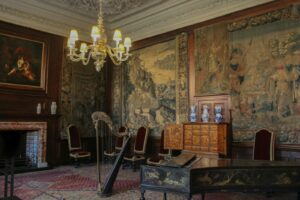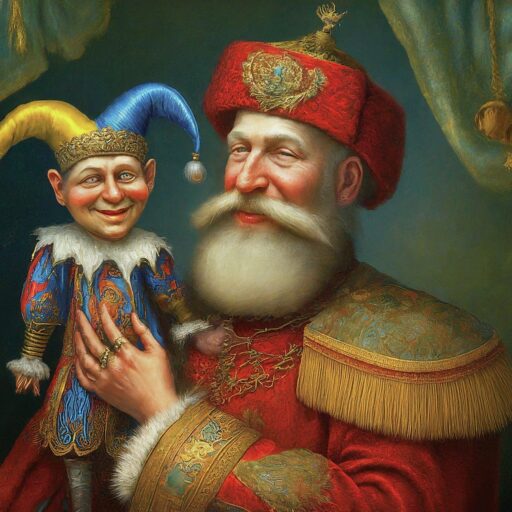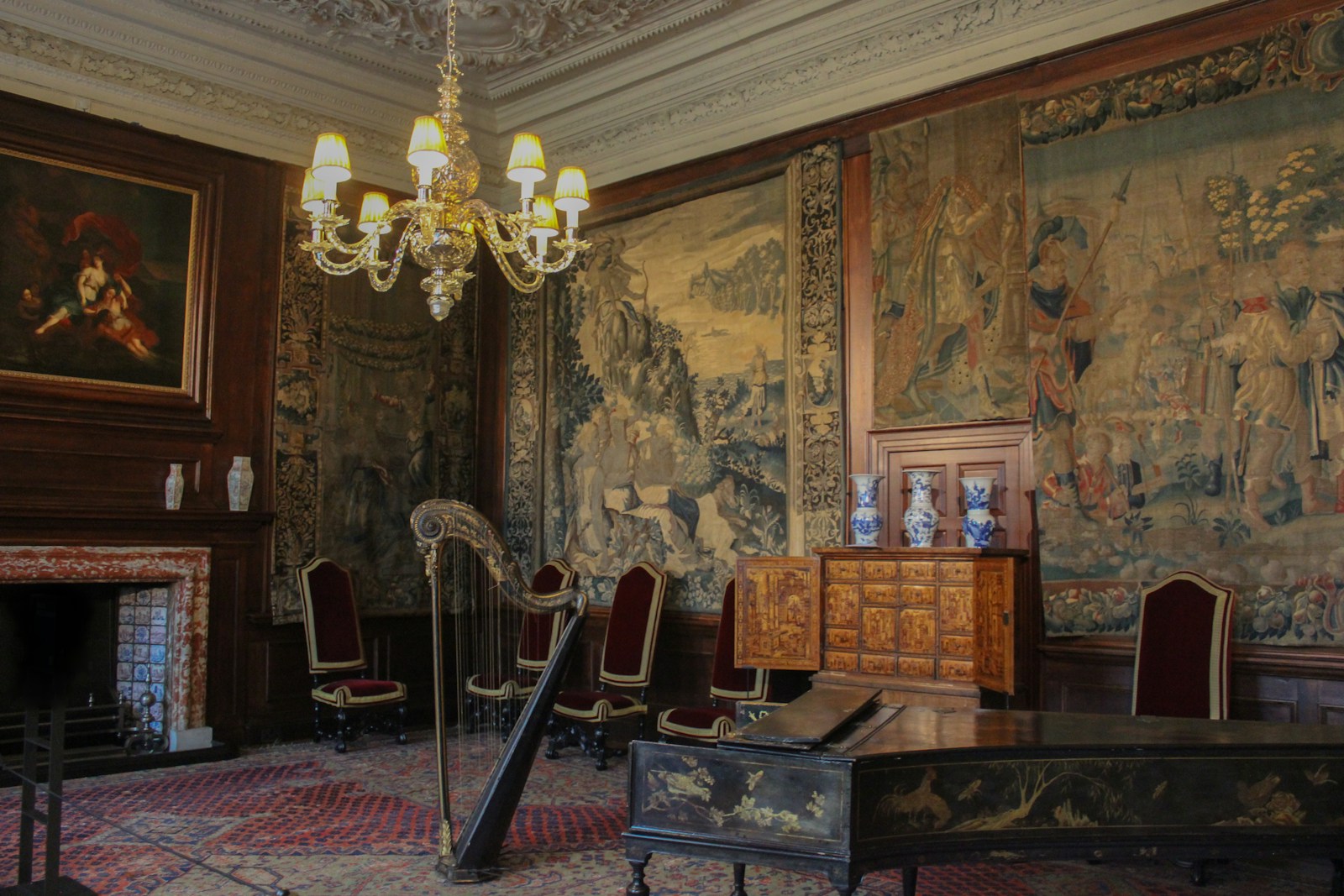The Kremlin Palace
Tsar Peter is in his quarters in the Kremlin Palace. Earlier in the evening he had been with his favorite mistress. Now he is content to be alone, relaxing in his favorite chair in front of the fireplace with a coffee and a snifter of brandy, reflecting over a career that has taken him from the humblest of origins to the very pinnacle of wealth and power, not just in Russia, but—indeed—the world.
He looks around the room with its coffered high ceiling hung with glittering chandeliers, its stately wood paneled walls, gilt-framed, original oil paintings by French, Dutch, and Italian masters (pilfered from a Romanov palace at the time of the 1917 revolution), in-laid parquet and marble tile floor and thick rich carpets, and contrasts its opulence with the gray cinder-block drabness of the dank and always cold Leningrad tenement where he had grown up as a boy, living in relative penury and sharing with his mother and father (a lowly factory worker) a single-room apartment. He remembers how his family made use of a makeshift bathroom down the hall—with no heat and no running water, and a single toilet—that they shared communally with six other families.

He comforts himself that now—at not quite seventy-years-old—he is probably the single richest man in the world. Westerners (particularly in America) proudly boast of the wealth of men like Buffett, Bezos, Gates, and Zuckerberg, but Tsar Peter knows his wealth is many times that of any of those celebrated western capitalists. In fact, he cannot be sure himself of the exact figure, only that he could give ten million dollars to every member of the U.S. Congress (Democrats and Republicans alike) and it would probably be less than two or three percent of his estimated wealth. He and his oligarch friends have already funneled hundreds of millions of dollars—largely to Republicans—through dark money PACs, and political interest groups like the NRA to influence U.S. government policy and effect elections. The current Senate majority leader, along with the recent former chairman of the House Intelligence committee, are good examples of two Republicans thoroughly corrupted by Russian money. The Senate Majority leader, Mitch McConnell (The Devil), may not personally like the president, or agree with any of his policies, but he has nothing to say in the matter because the president of Russia controls him and a majority of his Republican caucus in the Senate. Tsar Peter is amazed as always how the greed and sheer cupidity of American politicians is something that cannot be overestimated.
The president of Russia sips his brandy and thinks with pride as he reflects on his youth, remembers his training in Sambo—a Soviet martial arts discipline that is a mix of judo, karate, and folk wrestling—his love of the sport and how with his slight stature it had given him the confidence and courage to prevail in contests with opponents who were physically much bigger and stronger. He relishes the reputation he had enjoyed as a youthful brawler and street fighter. The lessons learned in his hard scrabble youth—the toughness he acquired—had served him well in his early career in the KGB (forerunner to the current FSB) and helped in his subsequent rise in the ruthless arena of Russian politics. He sees himself not only as a survivor—but a winner.
“I was a thug—a street fighter,” he proudly proclaimed to his early biographers. He learned early in life: “It’s not necessary that people like you—only that they fear and respect you.” This would remain a cardinal operating principle for the rest of his life. Inspired first by the bestselling novel The Shield and the Sword, and the subsequent wildly popular miniseries, he romanticized for himself a life in his country’s intelligence service, the KGB, as a kind of Soviet-style James Bond.
It has not, however, always been easy. He remembers with some chagrin those early KGB years when—living in unhappy exile in Dresden—he was a faceless and anonymous, desk-bound bureaucrat (clerk) cutting innocuous, seemingly meaningless clippings from Western newspapers and journals and posting them in equally meaningless KGB intelligence files.
The collapse of the Soviet empire was one of the most depressing periods of his life. He would later, in a 2005 annual address to the nation, call the breakup of the Soviet Union “the greatest geopolitical catastrophe of the twentieth century.” It would, however, in an odd twist be the catapult that would launch the former totally anonymous KGB officer onto the world stage. He and his family left unhappy Dresden, arriving in Leningrad with the clothes on their backs, a battered old car, and a washing machine given to them by a friendly neighbor. He then took up a position at Leningrad University where (he told his biographers) he briefly taught law. Other accounts have him working as a cab driver using his own car, a Trabant brought from East Germany.
By 1995 he had been appointed deputy mayor under the popularly elected Anatoly Sobchak. He was put in charge of foreign trade, a function typically reserved for KGB officers. Since the Russian ruble was then a defunct currency not accepted or convertible in international trade, Russian cities like Leningrad (St. Petersburg) were forced to export under barter agreements (contracts) with trading partners minerals and raw commodities in exchange for the food stuffs and other goods the city needed. He took charge and himself executed many of these contracts. The report of a crusading investigative journalist would later reveal that for Leningrad alone, although more than a billion dollars of commodities—including aluminum, oil, and cotton—had been exported, the food that the city so desperately needed (contracted for by deputy mayor’s mafia cronies) never arrived. Although his name rarely appeared on the contracts, the report showed, however, that as much as 25 to 50 percent of a contract’s total value was often paid as commission to shell companies owned by him and his oligarch friends. Kickbacks—paid in redeemable hard currencies—were a routine part of the business. This kind of public corruption was happening throughout Russia. The wealth of an entire nation—the former Union of Soviet Socialist Republics—was being transformed (stolen from the Russian people), in true kleptocratic fashion, into the personal property of a few privileged oligarchs. When called to account, the deputy mayor later blamed the theft on the crooked and dishonest suppliers.
Working with Sobchak cronies and an emerging cadre of wealthy oligarchs profiting from the new privatization policies, the once lowly Dresden KGB clerk, made the beginning of what would become an enormous personal fortune through an elaborate scheme of bribes and kickbacks. When, the following June 1996, his patron, Sobchak, lost in his reelection for mayor of St. Petersburg, he moved to Moscow two months later where he was made a deputy to Boris Yeltsin, the then president of Russia. By 1999, on the recommendation of the newly rich oligarch, Boris Berezovsky, the former deputy mayor was appointed prime minister of Russia in the soon to dissolve Yeltsin government. On December 31st, the Y2K eve of a new millennium, the unpopular, often drunk, and ailing Yeltsin essentially abdicated and appointed the once lowly KGB clerk president of Russia, immediately making him the incumbent in the upcoming national election. The new president—who was now wildly popular—won the election, and in March 2000 became the president of the new Russian federation.
Of all his accomplishments in a long career from a lowly, faceless KGB clerk to Russian president, the most important—earth shaking in its potential consequences for the whole world—was his success during the stunning and surprising upset 2016 U.S. election in defeating Hillary Clinton and making The Bad King, by this time a totally compromised (morally and financially) Russian agent, the newly elected president of the United States—the single biggest intelligence coup of the bygone twentieth century as well as the new 21st. An accomplishment for which the former KGB officer and now powerful Russian president—in looking back over his long career that night, alone by himself in the Kremlin Palace—was happy to acknowledge and claim credit. He congratulates himself at the popular tag name for the U.S. president—the Tsar’s Puppet.
With a smile and a little laugh, he then recalls how in early 2019 The Bad King had announced that he was unilaterally withdrawing the United States from a nuclear arms agreement with Russia. In his usual self-serving political way, the president of the United States tried to characterize the move as, in his words, “getting tough on Russia,” when, in fact, such an action was, in the words of both U.S. and European defense analysts, “a gift” to Russia and something The Bad King had promised the Russian president he would do (sell-out his own country) in their earlier private (secret) talks in Helsinki and at the Hamburg G-20 summit.

